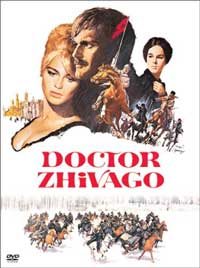|
|

    
directed by David Lean
Warner Brothers
|
| This film is a gift on DVD. For
the longest time, I always thought that, of Lean’s three classic epics, Dr.
Zhivago was the lesser effort. Now, I’m not so sure. Visually, it’s on par
with anything he’s done. Emotionally, I think it may be the one of the most complex
works of all. It would be easy to categorize this as a tragic love story, but it is more
than that; it is a story about the capricious nature of love. Lean wisely resists the
temptation to stumble into an overly sentimental piece that wreaks havoc on your heart
strings. There is a caculated level of dispassion that allows you to think about and
question the actions and intentions of the principle characters. A film like this
deserves a book, not a few hundred scant words. This is the second time I’ve seen it.
The first was a laser disc about twelve years ago, and it’s only gotten better with
time. I was blown away by Dr. Zhivago the first time I saw it. I was so overwhelmed
by the impact of the film that I couldn’t really take it all in. When I reflected on
it, I remembered moments or scenes. I was unable to see it as whole. It is that powerful
of an experience. It took a second viewing for me to get at some of the story’s
themes. It will probably take a few more viewings before I can really make any sense of
the whole thing.
At the center of the film is Yuri Zhivago, the doctor/poet, who is filled with so much
wonder at life that he is unable to really decide who or what he wants to be. Swept to and
fro, he seems unable to stand for anything other than beauty and decency. He takes what
life throws at him in stride without ever really seeking anything out for himself. His
experiences, his wife, and even his mistress are given to him, and he accepts it all
without questioning. It’s not that he’s not a good person; it’s that his
goodness is passive in a world of active evil.
The Russian revolution is the backdrop to the story.
One of the problems with juxtaposing love stories with larger than life settings is that
the setting will often overtake the characters. The biggest fault with Titanic is
that the movie is more about the boat than the lovers. One can only care so much about a
boat. Lean is able to give full weight to the change that overtakes the lives of these
characters without ever letting the revolution take center stage.
When talking of a Lean film, it’s easy to speak of the visuals. They are so
powerful that it would be easy for cinematography alone to overtake all other aspects of
the film, but his compositions serve the story and characters rather than the other way
around. Many films today are concerned with style over substance while others eschew all
pretense of style to focus solely on the substance. The greatest films, like great works
of art in any genre, balance these two things.
If you haven’t seen a widescreen transfer of
this film, then you haven’t really seen it. The composition of each individual frame
is a wonder of meticulous detail. In a time decades before CGI trickery, Lean seems to
exercise control over every element of a given shot. The man seems able to direct the
steam that rises from the train. My favorite shot is one that has been seared into my
brain. It lasts less than 5 seconds, but whenever anyone brings up Dr. Zhivago, it’s
the first thing that I think of. The camera fixes on a small section of a frozen lake. A
small army marches into the frame and we only see their boots and the cracks in the ice
spidering out with each step. The simple fact that I can remember such a small detail so
clearly says volumes about the cinematic prowess of Lean. His films almost seem like a
series of still photographs.
The transfer of this film is nothing short of stunning. If you’ve seen the DVD
transfers of Lawrence or Bridge Over the River Kwai, then you should have
some idea of how good a Lean film can look on DVD, but even those movies did not prepare
me for how immaculate this film would be. I could find absolutely no fault with the
picture. The DVD also has a new 5.1 mix which makes good use of the front soundstage and
rears without being too distracting.
There are plenty of supplements on the disc to keep you occupied. The most significant
is the documentary taken from the Laserdisc box set. It gives you more than enough
insights into the filming of the movie. It almost makes the commentary track with Omar
Shariff, David Lean’s wife and Rod Steiger redundant. There are a few promotional
shorts made during the filming of the movie and some footage from the New York premiere.
So many great films get the short end of the stick when it comes to extra features;
it’s nice to see some of the great films finally get the treatment that they deserve.
Jason Frank (11/20/2001) |
|
Snapshot
 Ups: Lots of
extras; wonderful, classic film; excellent transfer. Ups: Lots of
extras; wonderful, classic film; excellent transfer.
Downs: What downs?
Platform: DVD
|
|
|
|
|
|
|
|
